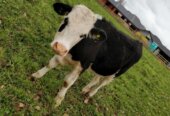A Waipā submission to the Ministry for the Environment about food recycling will include a suggestion to look at channelling some food waste to animals first before composting.

Susan O’Regan and husband John Hayward (pictured) feed kiwifruit to their dairy cows.
The suggestion came from councillor Susan O’Regan who owns a dairy farm in Roto-o-Rangi and feeds her cows rejected kiwifruit and carrots.
Other food rejected for aesthetic reasons could also be fed to animals, she told the council at its meeting this week.
Waste Minimisation officer Sally Fraser tabled a submission she had written to the ministry. In it she said it was unrealistic to expect the district to offer kerbside household food waste collection by 2025 and proposed a 2030 date at the earliest.
The district is 150kms from an established composting facility and having rolled out wheelie bins in the last two years, adding a food waste collection was a “huge task” for a small council.

Waste minimisation officer, Sally Fraser sharing tips and ideas at Waipā District Council’s 2020 Plastic Free July pop up stand.
None of the councils offering food waste collections have come close to getting 100 per cent out of the rubbish, said Fraser. “So overall it seems unrealistic as a minimum target, especially considering there are proposed financial penalties if not achieved.”
Councillors agreed with one asking whether using waste disposal units installed in sinks was providing the right solution.

Mike Pettit
Mike Pettit says it might seem to residents who have the units, and most new homes come with them, that they are doing the right thing in getting rid of waste.
But it goes straight into the sewerage system which council then had to treat, he said.
O’Regan said many farmers were seeing the benefits of feeding their animals food which while rejected because of some “human-created” standard was perfectly good to give to animals.
“Kiwifruit is really great for cows.” O’Regan said the kiwifruit fed to her cows had been rejected for export because of size and appearance.

Susan O’Regan
“It can be a positive way of using those reject goods.”
She gave the example of muesli bars which get packed, but the chocolate layer might be slightly too thick because a bar did not match the packaging.
Grain from the beer making process was another option for animals, she said.
“If it can’t be eaten by a human, it could be eaten by an animal and then composted.”
Mayor Jim Mylchreest said the government should avoid using arbitrary timelines before they set up proper guidelines.
“Someone needs to come up with a solution that is going to work.”









